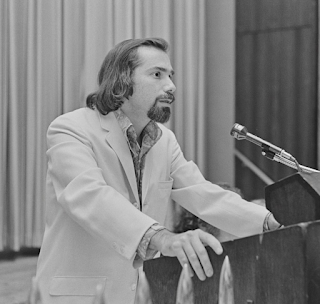This blog post is the 20th in a series examining past winners of the Best Dramatic Presentation Hugo Award. An introductory blog post is here.
 |
| Imagine the producers of these four movies being told that ‘no award’ got a standing ovation,” award presenter Robert Silverberg noted wryly. (Image from the 1971 Hugos by Jay Kay Klein) |
It’s a shortlist that’s difficult to argue with: Logan’s Run, Futureworld, The Man Who Fell To Earth, and Carrie are all notable movies that have held up relatively well.
But that shortlist suffered from bad timing, having been announced on April 15, 1977 … just 40 days before the release of possibly the biggest science fiction movie in history. To say that these four movies were overshadowed by Star Wars would be an understatement.
That year’s Hugo Awards presenter Robert Silverberg (appearing on stage with a Wookie) warned the audience that “Best Dramatic Presentation … no, no, it is not Star Wars. Star Wars is not eligible this year.”
And when he announced that there would be no award for Best Dramatic Presentation, the crowd cheered — possibly the loudest cheers of the whole evening.
Star Wars was revolutionary. It transformed the pop cultural landscape, and one can understand how it eclipsed all other science fiction cinema. In retrospect, however, all the finalists are interesting and worth watching — at least from the perspective of the history of genre cinema — and it seems a shame that they were snubbed.
In some ways, the nomination of Futureworld seems like the end of an era in Hugo cinema. Through the 1970s, a certain class of B-grade movies that didn’t require massive special effects budgets and often over-explained their very serious science fiction premises to the audience made frequent appearances on the ballot. The Immortal, Questor Tapes, and The People (among others) share similar pacing, similar lighting, and similar stodginess. Futureworld fits into this mold fairly closely, though some of the big ideas are relatively compelling. The premise is fundamentally sound; and it’s interesting to explore the idea that the androids from the first movie are being used to replace high-profile politicians and subvert democracy. It’s essentially an anticapitalist riff on The Pod People, though most of the ideas in the original Futureworld were explored with more nuance on the recent HBO remake.
 |
| Although the movie has some shaky moments, David Bowie is iconic as Thomas Jerome Newton. (Image via Hollywood Reporter) |
At almost the opposite end of the cinematic spectrum is The Man Who Fell To Earth, a ponderous, perplexing, and unsettling piece of arthouse cinema directed by Nicholas Roeg. The movie features David Bowie as the alien Thomas Jerome Newton on a mission to bring water back to his home planet. Armed with a vast archive of scientific knowledge, he starts businesses and investments, building a ship to take himself back to his home planet. Over the course of decades, he becomes seduced by the carnal pleasures available to him on Earth, and loses his way. Based on a novel by Walter Tevis (Queen’s Gambit, Mockingbird, The Hustler), the movie feels incomplete; like more effort was put into visuals than plotting, without much consideration for what the story adds up to.
Though it ended up on the Hugo ballot, there was a significant and vociferous faction of fandom that loathed Logan’s Run. Contemporaneous fanzine reviews described it as “ludicrous,” “hackneyed,” and “insulting.” But with the benefit of four decades of hindsight, we’d suggest it holds up admirably well. Adapted from a novel by William F. Nolan and George Clayton Johnson, the movie explores a society in which citizens are given a maximum lifespan, and are culled the day they turn 30. It’s a broadly ephebiphobic commentary on contemporaneous youth culture; and is reflected in various ways in generations of young-adult dystopias such as The Maze Runner and Divergent. The filmmaking is ambitious, lush, and looks great. One of the striking things about Logan’s Run is just how sex-positive the movie is; this hedonistic society puts consent at the forefront, and accepts homosexuality without judgment. For the era, it’s exceptionally progressive on these fronts.
 |
| There are portions of Carrie where every frame of the movie is riveting and spectacular. (Image via ABC News) |
The Hugo Award should have gone to Carrie or to Logan’s Run. The Worldcon snubbed some great filmmaking that may not have been as momentous and era-defining as Star Wars, but still deserved respect, as did the efforts of those who nominated.
Note: Our series of blog posts about Hugo-shortlisted movies will be on hiatus for the next several months while one of our key contributors recovers from surgery.

In retrospect a notable miss here is *Freaky Friday*.
ReplyDelete